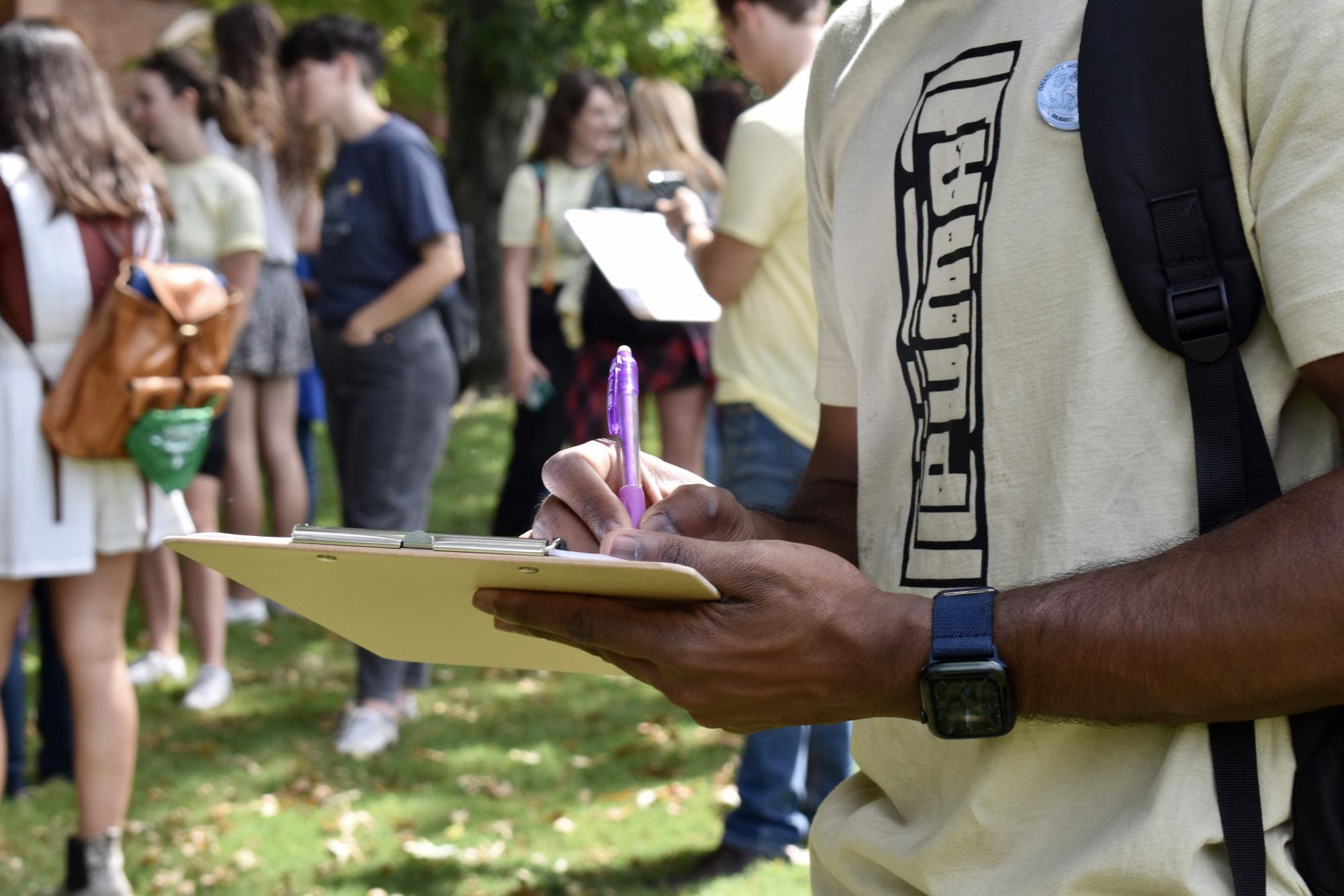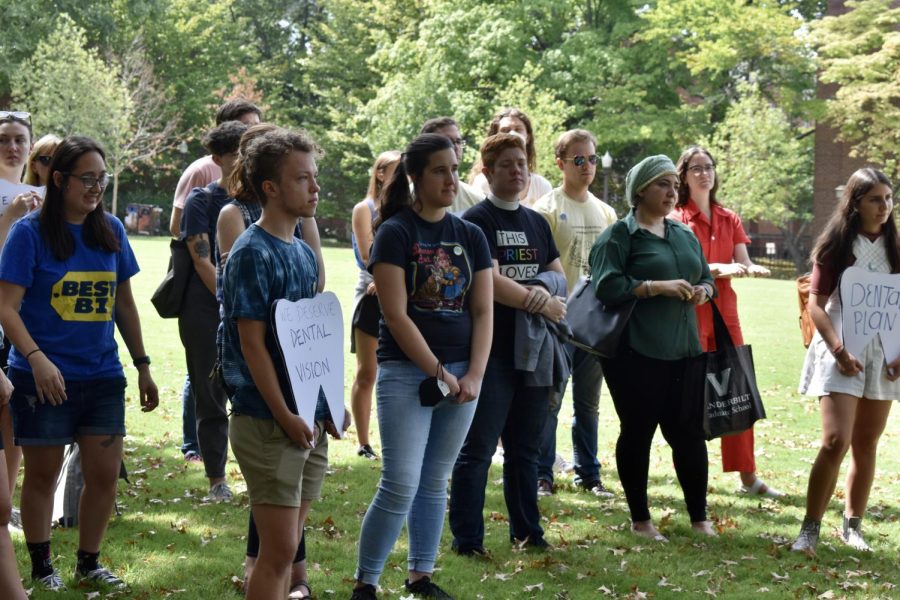As former and current Graduate Student Council Presidents with a combined decade of experience at Vanderbilt University, we have seen firsthand the dedication and hard work that graduate students pour into their academic and professional pursuits. We have also witnessed the challenges they face — ranging from difficult working conditions to inadequate financial support — and how those challenges have been only marginally addressed over the years.
That is why, today, we are pleased to announce our undivided support for the forthcoming vote to form a graduate workers union.
Opponents of unionization argue that such a move would disrupt the “collaborative environment” of the university and that the GSC already sufficiently represents student concerns to the university. But, as student officers, our influence and ability to collaborate with administrators only goes so far.
The GSC functions in an advisory capacity. Our most regular touch point with administrators is a once-a-month meeting with Dean Andre Christie-Mizell that lasts about an hour. While the council may provide valuable feedback to the dean, we are ultimately left out of the room when decisions get made on the issues that most impact us, from wages to healthcare and work expectations. This lack of representation is frequently felt in subpar outcomes, such as new graduate student housing that is too expensive for most graduate students to afford.
A union, by contrast, would unlock a real seat at the table with the Vanderbilt administration. Unlike the GSC, which can only issue advisory resolutions, a union would have the legal power needed to negotiate binding agreements that improve student welfare. For example, recently unionized graduate students at Duke University just negotiated stipend increases of at least $40,000 per year with 3 percent annual raises. In addition, this spring, our unionized colleagues at Johns Hopkins secured salaries that will grow to $52,000 by 2026. More than trivial, one-time raises, these victories represent life-changing stipend boosts that will enable students to flourish in both their academic and personal pursuits for the duration of their studies.
It’s no wonder that our peers at Duke voted 1000-131 to unionize and that the number of graduate student employees in U.S. unions grew by 133 percent in the last decade — it pays to be represented collectively.
Unionization, however, is not just about wages and benefits; it’s also about dignity and respect. We are deeply disappointed to learn that Vanderbilt deans, in official court proceedings, have claimed that graduate students “spend most of their time not doing much,” and that our course instruction and research “provide no value to the institution.” This could not be further from the truth.
On the contrary, we graduate students know that our labor contributes immense value to the university and that university functions would grind to a halt without us.
The opportunity ahead of us could not be more clear — it’s time we earn recognition for our work through the power of collective bargaining.
Fellow graduate students, we strongly urge you to vote in favor of unionizing. Together, we can transform the Vanderbilt community into one that’s more equitable, respectful and supportive of graduate students for years to come — but only if we vote ‘Yes’ now.
Signed,
Bill Smith, GSC President 2024
Kyra Smart, GSC President 2022-24
Miguel Moravec, GSC President 2022
Dr. Kelsea Best, GSC President 2019-20
Editor's Note: The university responded to The Hustler’s request for comment regarding university administrators' court statements cited in this piece. The response in full can be found below.
“It is disheartening that testimony at the hearing has been taken out of context and the meaning twisted to serve the union’s agenda. We are stunned that university leaders who are widely respected and deeply supportive of graduate students are being characterized in such an unscrupulous manner.
In context, all [administrators' statements] are referring to the opportunities and support we provide to students who have made the choice to forgo full-time employment to pursue educational goals, including experiential opportunities for the practice of instruction and research that will prepare them for careers as academics, scholars and professionals. As part of their scholarly development, we encourage doctoral students to engage in teaching and research assistantships that are aligned with their individual goals.”







nate • Nov 5, 2024 at 11:49 am CST
let’s go vandy grad workers united!!!!
Jade Miller • Nov 5, 2024 at 11:17 am CST
Excited for our union! Vanderbilt grad workers deserve better!
savannah bastian • Nov 5, 2024 at 11:12 am CST
I appreciate the courage and service of our GSC leaders. I’ll be damned! We are being shamed for our entirely sane/reasonable response to the comments made in the hearing. Remember that propaganda would be unnecessary if the situation was hopeless. What is insane to me is the intimidation we have been subjected to for behaving within our legal rights. I’m soooo excited to vote yes. Thanks to folks at The Hustler for keeping the community up to date on our issues and perspectives!
Graduate Student Worker • Nov 5, 2024 at 9:51 am CST
The administrations response, here, and to the unionization effort in general is, absurd.
The context for the deans’ quotes is that at our NLRB hearing, they argued that grad student RAs, TAs, GAs and instructors at Vanderbilt are not doing work-as opposed to the grads doing similar labor at scores of universities with recognized across the nation, somehow. In order to maintain this radical and pretty clearly weak argument, they made misleading, offensive, and outright untrue characterizations of their programs, grad student workers, our work and our value. Now, they are “disheartened” that people can see what they said.
Vanderbilt grad student workers have a right to know how low the administration is willing to sink to keep us from having a voice. Vote yes!
Future Union Yes Voter • Nov 5, 2024 at 9:17 am CST
It is really telling that Vandy admin’s response to this article doesn’t address any of the substantive arguments made by grad student workers. As usual, they want to deflect without engaging with the real issues we’re faced with.
It’s also worth noting that the hearing testimony admin is talking about was given to minimize our work’s impact on this institution. They don’t see us as workers, but they’re wrong. As stated in the article, numerous other universities employ unionized graduate student workers, and the federal government has repeatedly ruled that grad student workers are workers.
When making your decision on how to vote, ask yourself why your boss doesn’t want you to even be allowed to cast a ballot.